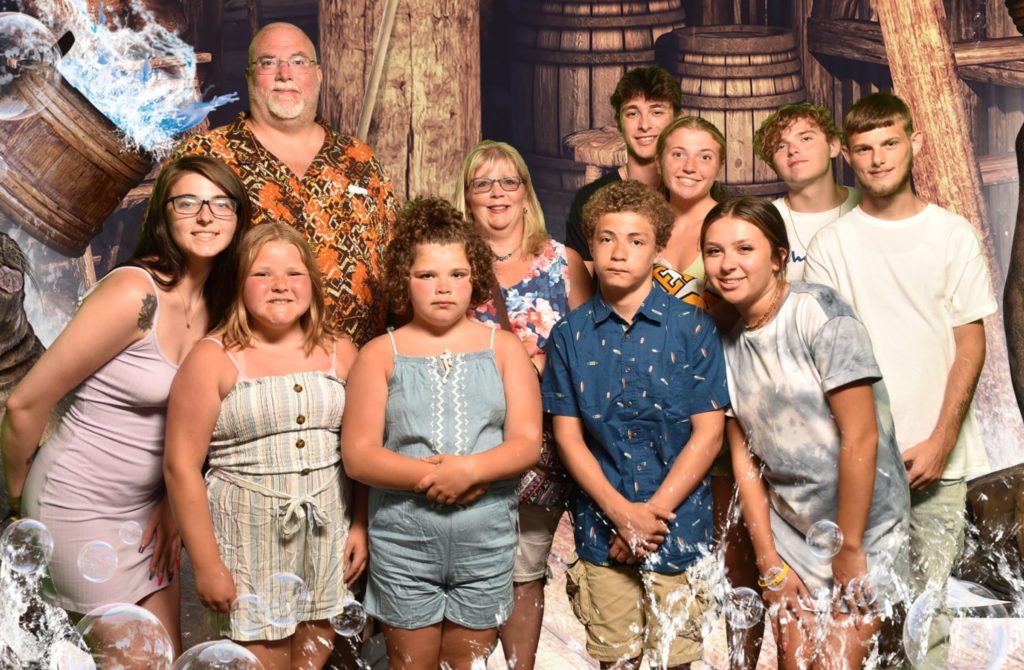Blog
Father Shares Encouraging Story About the Strength of Kinship as Mental and Emotional Support for His Children
For children and adolescents, family connectedness acts as a protective factor for their mental health. Fostering this sense of belonging and being cared for in youth can reduce the likelihood of a variety of health risk behaviors – including mental health challenges. Further, children and adolescents who feel connected at home are less likely to experience negative health outcomes related to substance use, violence, and mental health. Parents and caregivers can take steps every day to strengthen connections with their children and recognize warning signs that their child may be struggling with mental health.
As a loving father of seven, Bill Hughes, Director of Fiscal Operations at ASCI, and former ASCI caregiver, Hughes recognizes the important role family has on children’s social and mental well-being, and with his wife, Micki, diligently ensures all their children – whether biological or through kinship – know they are loved, valued, and part of one family.
“From the beginning, my family does not use prefixes,” Hughes shares.
“When I met my wife, she had a son, I then had a son. Then we had three more children together. I then had four children. In 2012, Alazaye, Brianna and Araina were initially placed with us. I then had seven children. They weren’t white children, Black children, bi-racial children, biological children, step children, or foster children. They were my children! While all of these can be used for clarification when necessary, in my eyes and my wife’s eyes, we don’t differentiate.”

Since the pandemic began, rates of psychological distress among young people have increased. With all parents and caregivers faced to cope with the unexpected challenges brought on by COVID-19, Hughes shares the initial concerns he and his wife had to address with their children while all learning to adapt.
“At the onset of the pandemic, they were afraid to go anywhere,” he explains. “They quickly adapted and accepted the mask mandates. However, they expressed sadness not getting to see their friends once schools went virtual, but then quickly became proficient using zoom and video chat.”
He continued, “On the downside, they became so reliant on devices and it seemed like their entire day was consumed with screen time and finding misplaced chargers. Wi-Fi was the most important thing on their minds. Gone was going to the park with friends, sleepovers and playdates. I noticed the girls, along with me gaining weight. Sitting in front of a screen all day, no exercise, no activity. Then the schools opened back up, and they didn’t want to go. They became complacent in front of a screen, rather than social interactions. As in the beginning, they adapted and now enjoy the in-person interactions with their friends and family again. Much like when they first came to us, they were able to adapt and thrive. Kids are resilient, much more so than most adults.”

Faced with many uncertainties during this time, Hughes’ family found comfort in one another and used kinship as their source of emotional support during socially challenging times.
“[My son] Alazaye (Zaye) has found comfort in his strong bond with his big brother – my biological son, Brandon. While there is a seven-year age gap, they do a lot of things together. He has a role model and someone to confide in. This has been a positive for not only Zaye but also for Brandon,” he shares.
“Because we have a large family, doing family activities together didn’t necessarily replace the social interactions with friends, but it filled the void that an only child would have faced. We have done family game nights, family movie nights, and campfires in the backyard. Once they were able to socially interact with friends, we encouraged them to go to the park and participate in school activities. We visit my parents every Sunday for dinner, so they get to spend time with their grandparents, aunts, uncles, and cousins.”
The Hughes family exemplifies the power that kinship has on children’s’ overall health and well-being, especially during trying times. As an agency dedicated to the health and well-being of children and families, we are proud to call Hughes one of our own!
For more information about how you can support young people’s mental health in any role you play, the U.S. Department of Health and Human Services Office of the U.S. Surgeon General provides helpful guidance.